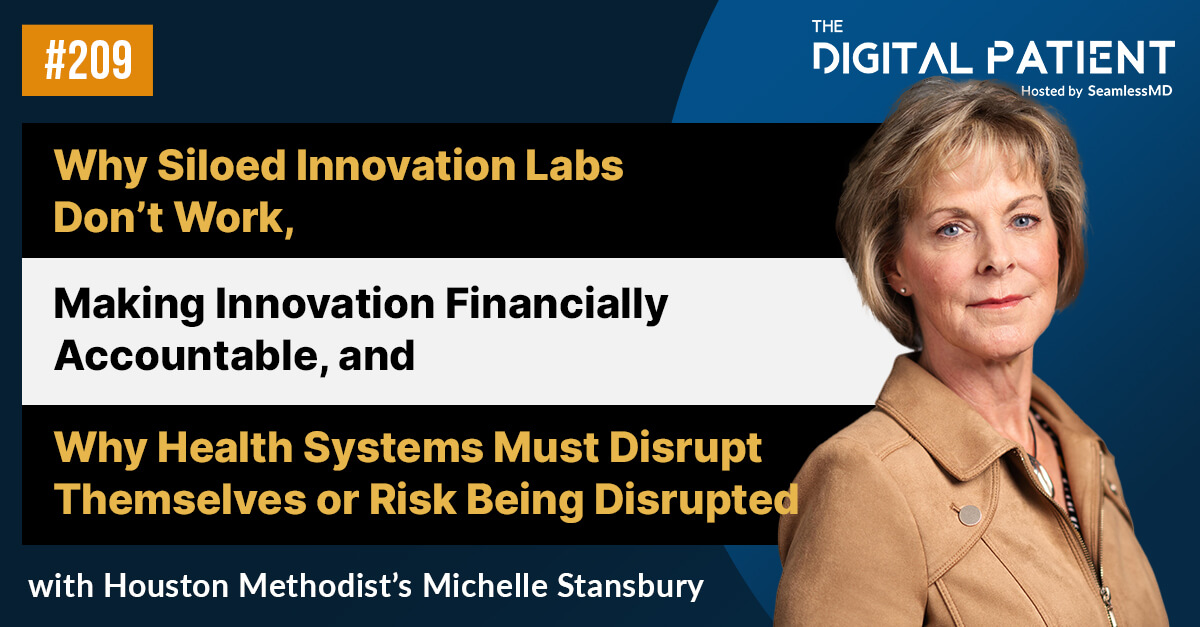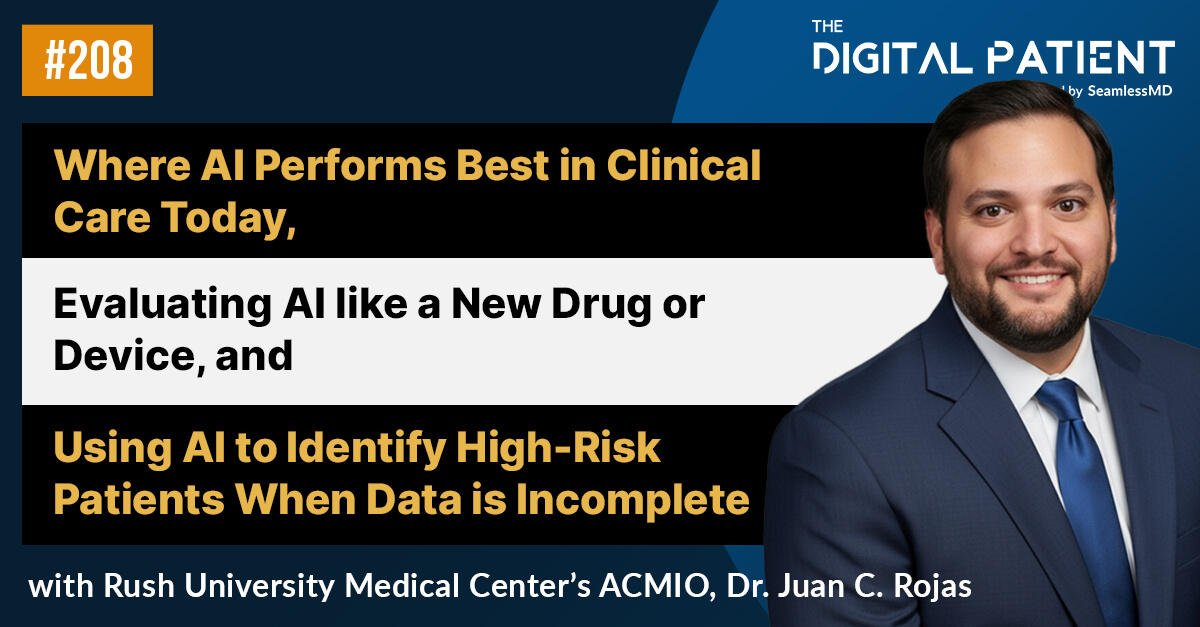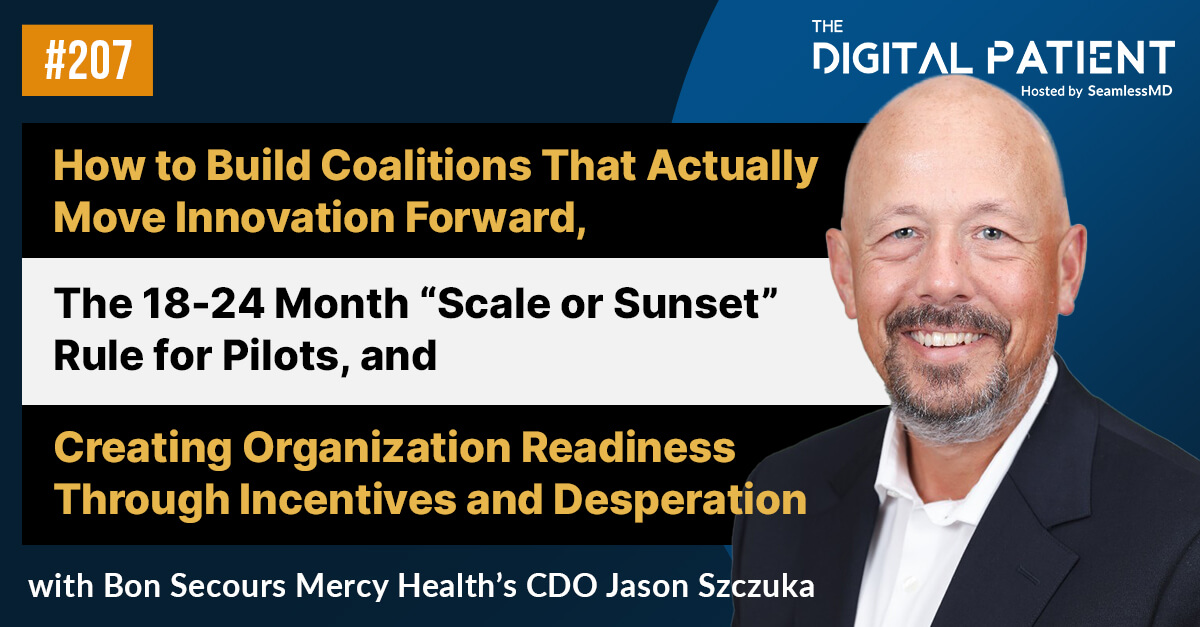Subscribe on: RSS | SPOTIFY | APPLE PODCAST | GOOGLE | BREAKER | ANCHOR
On this episode of "The Digital Patient" podcast, hosts Alan Sardana & Dr. Joshua Liu speak with Dr. Zafar Chaudry, Chief Digital & Information Officer at Seattle Children's, about "Learning From the UK System for Digital Health, Earning Your Title Every Day, Listening to Gen Z for Innovation, and more..." Click the play button to listen or read the show notes below.
Audio:
Video:
Guest(s):
- Dr. Zafar Chaudry (@drzchaudry), Chief Digital & Information Officer at Seattle Children's
- Dr. Joshua Liu (@joshuapliu), Co-founder & CEO at SeamlessMD
Episode 104 - Show Notes:
[00:01:18] Why Dr. Chaudry pursued medicine in the first place, mentioning the cultural expectations and limited options he had while growing up, and how he saw medicine as a stepping stone to pursue other interests;
[00:02:38] How Dr. Chaudry's journey into the world of digital health began with a discussion where he was offered the opportunity to learn more about technology in healthcare, which were the early days of basic systems and green screens;
[00:03:43] Why Dr. Chaudry believed in the power of technology in healthcare and how it has become indispensable for healthcare organizations, emphasizing the constant need to learn and adapt to new technologies;
[00:04:34] How health IT investment has increased YoY, with organizations now spending an average of 4.5% of their annual revenue on technology;
[00:06:15] Why Dr. Chaudry believes patient outcomes should be the primary focus in healthcare rather than solely emphasizing technological innovations, highlighting that despite the significant investment in new technologies in the US healthcare system, it has not translated into the best patient outcomes compared to countries like France, England, and Australia, which spend less but achieve better outcomes;
[00:07:03] How Dr. Chaudry views the main differences between the UK and US healthcare systems from a digital health perspective: In the UK, the driving factor is pride in providing free, accessible care, while in the US, the focus is more on revenue and individual success;
[00:10:01] Why Dr. Chaudry believes the US healthcare system can learn from the UK system regarding digital health by focusing on patient needs, involving patients in solution development, and implementing technology tailored to specific populations for improved adoption and cost-effectiveness;
[00:12:39] Why Dr. Chaudry believes that while not everyone requires an app, digital tools can benefit patients managing their health at home, suggesting apps could provide real-time appointment availability to reduce reliance on emergency room visits for non-urgent care, leading to cost savings;
[00:15:41] How a humbling conversation with a 14-year old cancer patient helped Dr. Chaudry recognize the significance of providing essential services and profoundly impacted his perspective as a healthcare CIO, ultimately shaping his career motto of prioritizing daily commitment to doing the right thing and emphasizing the importance of service over titles or past accomplishments;
[00:18:28] Why Dr. Chaudry highlights the importance of prioritizing foundational technology and fixing core basic services in healthcare to ensure system reliability, protection, and accessibility for healthcare professionals, emphasizing that effective healthcare delivery requires a strong foundation before implementing advanced digital solutions;
[00:22:29] How the approach to digital health in a pediatric hospital can be more challenging due to the involvement of multiple stakeholders, including parents and extended family members;
[00:24:10] Why Dr. Chaudry believes staying up-to-date with digital technology and meeting the expectations of young patients can be difficult, as they are often more proficient in technology than healthcare professionals, and how this reality leads to innovative projects, leveraging younger employee and patient input, such as a hospital-wide Minecraft/metaverse world;
[00:30:47] Why pediatrics is perfect for innovation, since children – who are constantly growing, learning, and are full of energy – are ideal for testing new technologies, yet there remains the challenge of cost and limited resources in pediatric hospitals;
[00:32:48] Why Dr. Chaudry believes 20% of his role is sales, as it is his responsibility to manage change and convince various stakeholders, such as physicians, nurses, and support staff, of the value of adopting new technologies, which includes showcasing new tools, educating end-users through committees and forums, addressing skepticism, and providing hands-on support to ensure user acceptance;
[00:35:00] How Dr. Chaudry applies the 80/20 rule to accomplish his “sales initiatives”, emphasizing the importance of convincing 80% of stakeholders that a particular tool, software, or technology is the right choice;
[00:43:11] How Dr. Chaudry views making information easily accessible by minimizing the number of clicks required, relaying the old web era concept of “three clicks” to reach your desired information;
[00:45:11] Why Dr. Chaudry believes it’s important to design technologies that don't require formal training classes or constant support and instead provide intuitive interfaces for patients, cautioning against overcomplicating healthcare apps;
[00:46:23] Why digital health tech needs to be co-designed, involving tech-illiterate users in the healthcare system to test and provide feedback on the app or solution, and how identifying flaws and issues early on by incorporating the perspective of end-users in the development process will help you save time and money in the long run;
[00:48:44] How Dr. Chaudry is tackling the digital divide including device availability, internet connectivity, and security among households of varying income levels, and why he emphasizes the need to consider a lack of access, particularly in rural areas, before layering on new and exciting tech;
[00:53:34] Why Dr. Chaudry emphasizes the need to consider social determinants of health, such as access to basic healthcare, food, education, and living environments, as they significantly impact overall well-being, and how healthcare organizations can address equity and support diverse populations when implementing digital health programs;
[00:55:58] Why it is crucial to consider the daily concerns and worries of individuals, particularly those related to basic needs like food, as they significant impact the individual’s well-being and places pressure on the healthcare system in the long run;
[00:57:39] How digital tools can help address social determinants of health and how integration of social support into healthcare apps can help bridge the gap and provide assistance to those facing food insecurity;
Fast 5 / Lightning Round:
- What is your favorite book or book you’ve gifted the most?
“Winnie the Pooh” by A. A. Milne
- Who is a person–dead or alive–you’d love to meet?
"Darth Vader"
- Would you rather have Super strength, super speed, or the ability to read people’s minds?
"Mind reading"
- What is something in healthcare you believe that others might find insane?
"How antiquated and hierarchical the culture is in healthcare"
- If you could travel back in time to any event or moment, what would it be and why?
"The 80s (the best music and a less stressful era)"
.svg)










.png)
